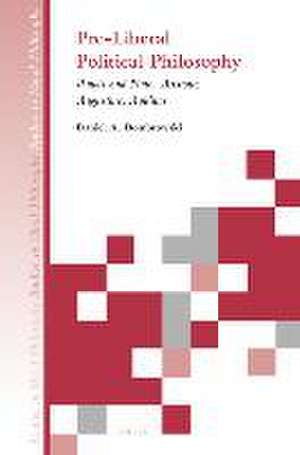Pre-Liberal Political Philosophy: Rawls and Plato, Aristotle, Augustine, Aquinas: Studies in Moral Philosophy, cartea 17
Autor Daniel A. Dombrowskien Limba Engleză Hardback – 24 mai 2022
Several illuminating connections are drawn between Rawls’s political liberalism and Plato’s contrasting appeal to the “noble lie” in politics, between Rawls’s overall method of reflective equilibrium and Aristotle’s dialectic, between Rawls’s opposition to merit in the distribution of wealth and Augustine’s similar anti-Pelagian stance, and between Rawls’s view of a just society as a common good of common goods and the natural law dimension of Aquinas’s philosophy. In general, the distance between Rawlsian abstraction and his historical embeddedness is lessened considerably.
Preț: 585.70 lei
Preț vechi: 714.26 lei
-18% Nou
Puncte Express: 879
Preț estimativ în valută:
112.08€ • 117.31$ • 93.28£
112.08€ • 117.31$ • 93.28£
Carte indisponibilă temporar
Doresc să fiu notificat când acest titlu va fi disponibil:
Se trimite...
Preluare comenzi: 021 569.72.76
Specificații
ISBN-13: 9789004520240
ISBN-10: 9004520244
Dimensiuni: 155 x 235 mm
Greutate: 0 kg
Editura: Brill
Colecția Brill
Seria Studies in Moral Philosophy
ISBN-10: 9004520244
Dimensiuni: 155 x 235 mm
Greutate: 0 kg
Editura: Brill
Colecția Brill
Seria Studies in Moral Philosophy
Notă biografică
Daniel A. Dombrowski is Professor of Philosophy at Seattle University. He is the author of twenty books and over one hundred and eighty articles in scholarly journals in philosophy, theology, classics, and literature. Among his books are Rethinking the Ontological Argument: A Neoclassical Theistic Perspective (Cambridge: Cambridge University Press, 2006); Contemporary Athletics and Ancient Greek Ideals (Chicago: University of Chicago Press, 2009); and Process Philosophy and Political Liberalism: Rawls, Whitehead, Hartshorne (Edinburgh: Edinburgh University Press, 2019).
Cuprins
Abbreviations
Introduction
1Rawls and Plato: The Noble Lie and Social Contract Theory
1 Introduction
2 The Very Early Rawls
3 The Mature Rawls and the Noble Lie
4 Ferguson’s Criticisms
5 Strauss and the Straussians
6 Page’s View
7 The Smith-Brickhouse Stance
8 Annas and Bok
9 Political Liberalism
10 Social Contract Theory
11 Conclusion
2Rawls and Aristotle: Reflective Equilibrium and the Battle between the Ancients and the Moderns
1 Introduction
2 Some Basic Similarities and Differences
3 Wolterstorff’s View
4 Dworkin’s View
5 Natural Rights
6 Critique of Wolterstorff’s View
7 Relativism
8 The Ancients and the Moderns
9 The Aristotelian Principle
10 Virtue
11 The Capabilities Approach
12 Conclusion
3Rawls and Augustine: Sin, Pluralism of Comprehensive Doctrines, and Nonideal Theory
1 Introduction
2 Sin
3 Infancy and Childhood
4 God as Personal
5 Pluralism of Comprehensive Doctrines
6 Just War Theory
7 Abortion
8 Nelson on Pelagianism
9 Conclusion
4Rawls and Aquinas: Deliberative Rationality, Love, and Justice
1 Introduction
2 The Common Good
3 Natural Duty
4 Faith and Sin
5 Nonhuman Animals
6 Deliberative Rationality
7 Types of Dominant Ends
8 Justice
9 Love
10 Freeman’s and Pogge’s Contributions
11 Facilitation of a Just Society
12 Conclusion
5Rawls and History: Ahistoricism and Contextualism
1 Introduction
2 Plato’s Philosophy of History
3 Two Interpretations of Kant
4 Crucial Points in History
5 Ahistoricism and Contextualism
6 Recognition
7 Robust Reasonableness
8 Lefebvre and Spiritual Exercises
9 Conclusion
Bibliography
Index
Introduction
1Rawls and Plato: The Noble Lie and Social Contract Theory
1 Introduction
2 The Very Early Rawls
3 The Mature Rawls and the Noble Lie
4 Ferguson’s Criticisms
5 Strauss and the Straussians
6 Page’s View
7 The Smith-Brickhouse Stance
8 Annas and Bok
9 Political Liberalism
10 Social Contract Theory
11 Conclusion
2Rawls and Aristotle: Reflective Equilibrium and the Battle between the Ancients and the Moderns
1 Introduction
2 Some Basic Similarities and Differences
3 Wolterstorff’s View
4 Dworkin’s View
5 Natural Rights
6 Critique of Wolterstorff’s View
7 Relativism
8 The Ancients and the Moderns
9 The Aristotelian Principle
10 Virtue
11 The Capabilities Approach
12 Conclusion
3Rawls and Augustine: Sin, Pluralism of Comprehensive Doctrines, and Nonideal Theory
1 Introduction
2 Sin
3 Infancy and Childhood
4 God as Personal
5 Pluralism of Comprehensive Doctrines
6 Just War Theory
7 Abortion
8 Nelson on Pelagianism
9 Conclusion
4Rawls and Aquinas: Deliberative Rationality, Love, and Justice
1 Introduction
2 The Common Good
3 Natural Duty
4 Faith and Sin
5 Nonhuman Animals
6 Deliberative Rationality
7 Types of Dominant Ends
8 Justice
9 Love
10 Freeman’s and Pogge’s Contributions
11 Facilitation of a Just Society
12 Conclusion
5Rawls and History: Ahistoricism and Contextualism
1 Introduction
2 Plato’s Philosophy of History
3 Two Interpretations of Kant
4 Crucial Points in History
5 Ahistoricism and Contextualism
6 Recognition
7 Robust Reasonableness
8 Lefebvre and Spiritual Exercises
9 Conclusion
Bibliography
Index














